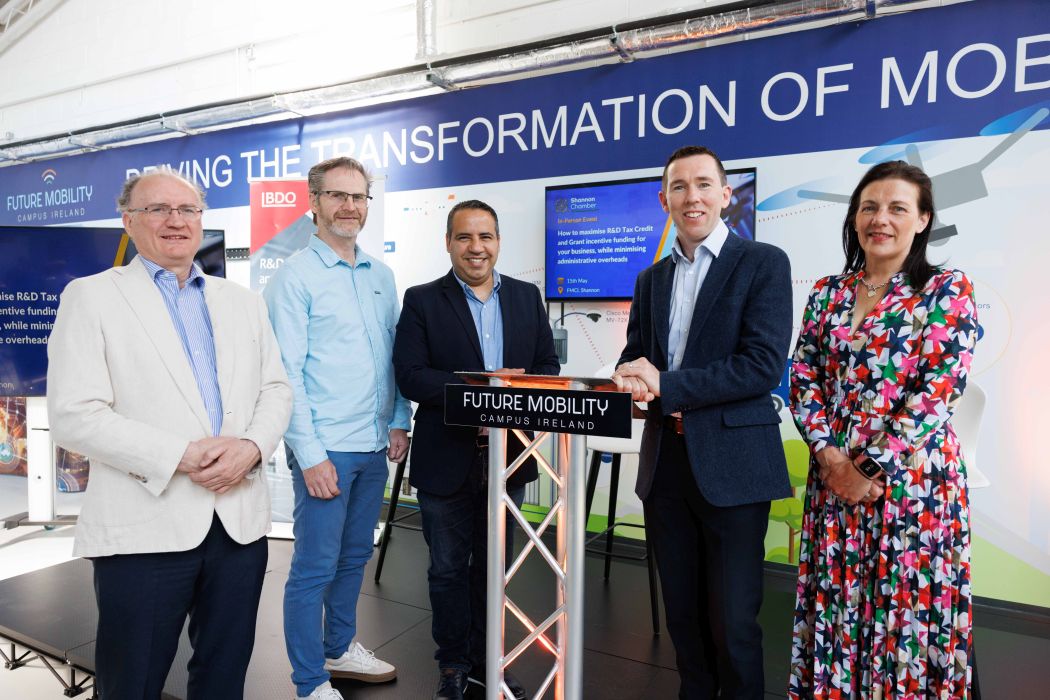
The critical role and value of Research and Development (R&D) tax credits and grants emphasised at Shannon Chamber event
Ian Barrett, managing director, Care About You and a director of Shannon Chamber with (from left): John Bolger, director of engineering , Siemens EDA; Dr. Wassim Derguech, co-founder and chief operating officer, FMCI; Mark O’Sullivan, partner and head of R&D incentives, BDO; and Fiona Gilchrist, R&D site engineering lead, Jaguar Land Rover Ireland (Services) Ltd. Photograph by Eamon Ward
Research and Development (R&D) activities undertaken by companies operating in Ireland has long been regarded as a driver of competitiveness, economic resilience, and long-term growth. Whether it’s a multinational company expanding its European footprint or a small and medium-sized enterprise (SME) aiming to scale, R&D provides the tools to innovate, grow, and thrive in an increasingly global and dynamic market.
The questions raised at a recent Shannon Chamber workshop, delivered by BDO and held in the Future Mobility Campus in Shannon were, how efficiently are companies doing this activity and whether they are maximising the incentives available to support their R&D activities in Ireland.
With fourteen years’ experience as a dedicated R&D tax credit and grant incentive advisor, BDO’s Mark O’Sullivan, partner and head of R&D incentives, shared his vast repertoire of knowledge with an audience comprising Shannon Chamber member companies currently undertaking R&D.
With qualifications in mechanical engineering, manufacturing and design engineering, medical physics, computer science, and a chartered tax advisor, there was little doubt that his fountain knowledge was worth listening to. His goal, in addressing his audience was to ensure that companies left the session with a greater understanding of how to maximise the efficiency and minimise the administrative obstacles and risk involved in applying for R&D tax credits, allowing their businesses to focus on their R&D.
Topics covered during the briefing included an overview of incentives available to support R&D and innovation in Ireland, recent legislative changes impacting the Irish R&D tax credit regime, an examination of dual applications for grants and tax credits, governance and compiling a robust claim, Irish R&D grant funding opportunities, how to plan for future R&D activities and what to be thinking about now.
With a 30% tax credit available for R&D undertaken in Ireland, in addition to a 12.5% corporation tax deduction, which makes investment in innovation financially attractive, attendees were taken through the criteria which must be met when applying for this credit They were enlightened as to the requirement to show the level of technological advancement involved, the technological uncertainty, the type of research being undertaken, the sequence of planned activities and the requirement to provide evidence of experiments carried out.
The correlation between tax credits and grants from State organisations was also explained.
“R&D grants are linked to items such as the advancement of a company’s site, job creation and growth whereas tax credits focus in on activities that categorically show technology or scientific advancement and are pure R&D,” said O’Sullivan.
This was endorsed by guest speakers, Dr. Fiona Gilchrist, R&D site engineering lead with Jaguar Land Rover Ireland Services Ltd., and John Bolger, director of engineering with Siemens EDA, both well practiced in managing R&D credits and grant applications for their respective organisations.
Their advice to companies, when applying for tax credits particularly, was to start the application earlier than planned, make sure they can explain the process involved to someone who does not understand their business and to remember that, while R&D activity solely is taken into account for tax credits, everything that is done on the project can be grant-aided.
Explaining the value of hosting an event of this nature, Shannon Chamber CEO Helen Downes said: “In the current climate, when Irish firms are facing global pressures like climate change, digitisation, and geopolitical shifts, being involved in R&D will enable them to develop sustainable technologies, adopt digital tools, and future-proof their operations.
“Linking in with BDO, the first engineer-led practice in Ireland, the first practice to deliver technical report drafting services to clients, and the first practice to deliver data analytic insights to clients, was invaluable. It led to proactive discussion on real issues that companies are dealing with and was so insightful for some of our member companies who are undertaking R&D but are not applying for tax credits.
“Attendees left with a greater appreciation of the value of both R&D tax credits and the grants and funding available to support R&D, particularly for SMEs and start-ups. They now appreciate that these incentives combined reduce the financial risk of investing in R&D,” Ms Downes added.
